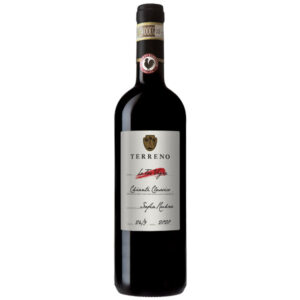Terreno TERRENO Le Bonille di Sopra Chianti Classico Riserva 2020
25,00 €
Characteristics
Description
Terreno Le Bonille di Sopra Chianti Classico Riserva is obtained from a blend of Sangiovese, Colorino and Cabernet Sauvignon vines, coming from the UGA Greve, on the right bank of the Greve river. The grapes are grown in the Le Bonille di Sopra vineyard, located on terraces with south and south-west exposure, at an altitude of 420 meters above sea level. The land is characterized by Alberese soil, composed of a mix of sandstone with a high concentration of limestone, which gives it a typical “flake” conformation known as marl.
The grapes are harvested by hand in small boxes to preserve the integrity of the fruit. Fermentation is started with the exclusive use of natural yeasts and takes place in open 10 hl tubs, which favor optimal oxygenation and greater complexity. The wine matures for 24 months in large 24 hl oak barrels and, subsequently, refines for at least a year in the bottle in the Terreno cellar.
The residual sugar content is 0.5 g/l. Considered one of the best vintages of the millennium, 2019 offered balanced temperatures throughout the year, producing elegant and complex wines ideal for aging. This vintage is reminiscent of the great Chianti Classicos of the 1980s, with extraordinary potential for evolution. The Terreno Le Bonille di Sopra Chianti ClassicoRiserva presents inviting aromas of ripe cherry, berries and peppery spices. On the palate, notes of finely preserved fruit emerge, with hints of chocolate and tobacco.
It is a full-bodied wine, with a marked freshness and very elegant tannins, ideal for aging. The versatility of the Terreno Le Bonille di Sopra Chianti Riserva makes it perfect for different culinary combinations. It pairs beautifully with rich lentil and chickpea soups, risotto with Tuscan pecorino and sausage, or a tender Florentine steak.
The Terreno winery is located in the heart of Chianti Classico, near the town of Greve in Chianti, where viticulture is a tradition that dates back to Roman times. The Ruhne family began producing wine in 1988 and today the winery is completely self-sufficient from an energy point of view, with the aim of passing the land on to future generations in better conditions than when it was acquired.
Additional information
| Weight | 1,5 kg |
|---|---|
| Alcohol | 14% |
| Denomination | Chianti Classico |
| Formato | 0,75 L |
| Località | Greve in Chianti |
| Producer | |
| Regione | Toscana |
| Chianti classico | |
| Special categories | |
| Tipologia | Rosso |
| Vitigni | cabernet sauvignon, Colorino, Sangiovese |








